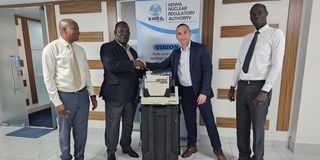Premium
Kenya, US step up fight against smuggling of nuclear materials

Jason Padilla of the US Department of Energy (second right) when he presented radiological detection equipment to Kenya Nuclear Regulatory Authority chairman Omondi Anyanga (second left) and Acting Director-General James Keter (right) in Nairobi on April 4, 2023. With them is Mr Edward Mayaka, a senior technical officer at the authority.
Kenya and the US officials have pledged to work together in improving regulation and combating the smuggling of nuclear material.
Officials of the Kenya Nuclear Regulatory Authority (KNRA) called for sustained cross-border efforts against the vice, saying nuclear misapplication has far-reaching consequences.
The officials spoke on Tuesday at the authority’s headquarters when they received equipment for the detection and identification of nuclear materials donated by the US Department of Energy.
Mr Jason Padilla, Senior Technical Advisor and US Department of Energy Nuclear Smuggling Detection and Deterrence Country Manager for Kenya, handed over equipment to KNRA chairman Omondi Anyanga and Acting Director General James Keter.
The Sh10 million Ortec Radio Isotopic Identification Device will be used for the detection and identification of radiological or nuclear materials out of regulatory control.
Mr Padilla said his organisation had implemented projects in Kenya, jointly with Kenya Ports Authority, Kenya Revenue Authority, Kenya Maritime Authority and various security agencies in deterring and detecting harmful nuclear and radioactive material before possible use by non-state actors.
Mr Anyanga lauded the US for collaborating with Kenya in improving the technical systems for the detection and identification of radioactive materials, saying radioactive material can be a major security threat when in the wrong hands.
“KNRA is keen to explore other areas of partnership with local and international partners that are geared towards providing a safe and secure environment for the public against materials that are out of regulatory control,” Mr Anyanga said.
He added: “We will continue exploring working relationships with entities locally and internationally while borrowing and learning from best practices. The authority believes safety in harnessing nuclear technology is sacrosanct.”
KNRA, a successor of the former Radiation Protection Board (RPB), is charged with providing protection of persons, property and the environment against harmful effects of ionizing and non-ionizing radiation through the establishment of a system of regulatory control.
“We thank the US and other partners for their support. The journey has begun. We will walk together to ensure safe and productive use of nuclear energy,” the chairman said.
The authority regulates applications involving the use of nuclear science technologies in Kenya and collaborates with other agencies locally and within the region to combat the illicit trafficking of nuclear and radioactive materials.
Last month, the United States Nuclear Regulatory Commission hosted an international conference of nuclear regulators where representatives of government agencies, NGOs, industry and other stakeholders brainstormed on emerging issues in the nuclear field. The Kenya Nuclear Regulatory Authority was represented at the global forum.





